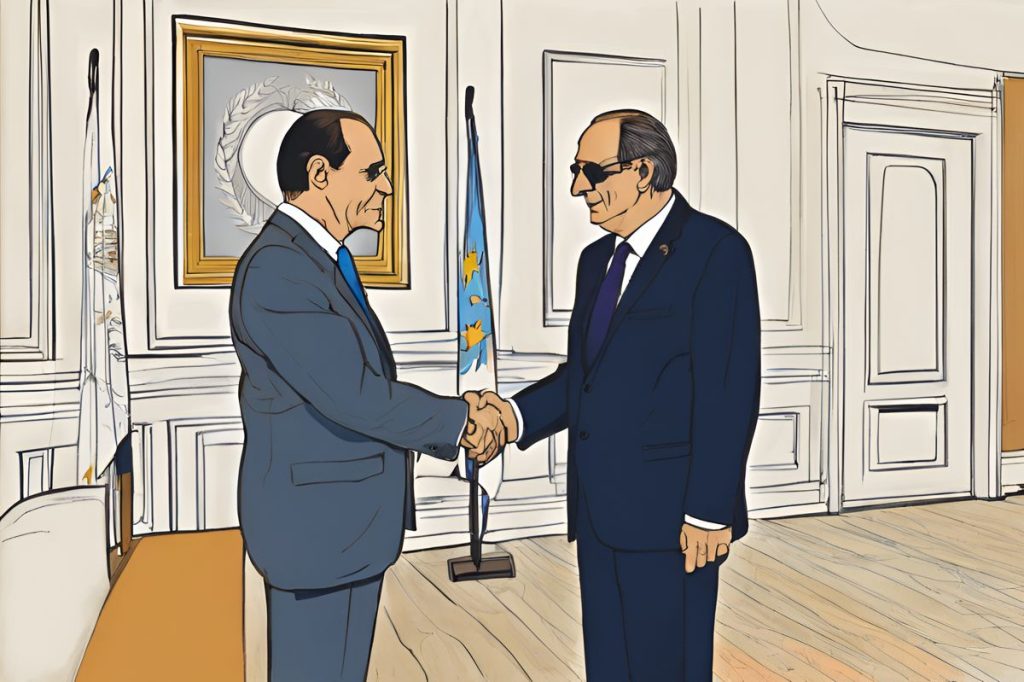The appointment of Maria Angela Holguin as the UN envoy in Cyprus highlights the Greek Cypriot side’s commitment to resolving the Cyprus problem through negotiations towards a bizonal, bicommunal federation, aligning with international bodies like the EU for support. President Nikos Christodoulides’ strategic move to prioritize the Cyprus issue and secure high-level diplomatic appointments signals a new chapter in Cypriot politics, emphasizing the need for proactive measures and collaboration from all parties to achieve a breakthrough.
What is the strategic significance of Maria Angela Holguin’s appointment as the UN envoy in Cyprus?
The appointment of Maria Angela Holguin as the UN envoy signifies a strategic move by Cyprus to rejuvenate negotiations for resolving the Cyprus problem. It represents the Greek Cypriot side’s readiness for talks and commitment to leveraging past progress towards a bizonal, bicommunal federation, while aligning with international bodies like the EU for a breakthrough.
A Presidential Evaluation
In a significant televised address, marking his first year as head of state, President Nikos Christodoulides placed the Cyprus issue at the forefront of government priorities. He proudly attributed the appointment of Maria Angela Holguin as the UN Secretary-General’s personal envoy to the relentless efforts and initiatives undertaken by his administration. The Cyprus problem, a complex and enduring political deadlock, necessitates such high-level appointments to catalyze a breakthrough.
The president emphasized the potential and readiness of the Greek Cypriot side to re-engage in negotiations, advocating for a solution based on a bizonal, bicommunal federation. This approach underscores a commitment to leverage past negotiation progress. Yet, amid these developments, there remains a subtle implication that securing Holguin’s role may have been an objective in itself, raising questions about the tangible outcomes of such diplomatic maneuvers.
The Blame Game and EU Involvement
President Christodoulides has been forthright in his recognition of the challenges posed by the Turkish stance on the Cyprus issue, yet he maintains a hopeful perspective on Holguin’s mission. He views it as an opportunity to kickstart substantive discussions, positioning the EU as a key player in this revitalized effort. This stance suggests a strategic alignment with international bodies and a calculated approach to potential stalemates.
Nevertheless, the president’s strategy seems to be hedging against possible failure by preemptively shifting responsibility. By emphasizing his administration’s willingness to negotiate and deflecting potential blame onto external factors, Christodoulides is maneuvering within a complex diplomatic chessboard.
The Road Ahead for Cyprus
As the president refrains from overtly acknowledging his role in persuading the Turkish side to rejoin talks, it becomes evident that the road ahead is fraught with political intricacies. The delicate balance between displaying readiness and actually effecting change on the ground is a testament to the intricate nature of international diplomacy, particularly in protracted conflicts such as the Cyprus problem.
The Turkish Cypriot contentment with the status quo introduces an additional layer of complication. President Christodoulides, however, has made it clear that the current impasse is unsustainable, highlighting the necessity for proactive measures. The onus rests not only on the appointed UN envoy but also on all parties involved to work collaboratively towards a resolution.
A New Chapter in Cypriot Politics
As Cyprus navigates this new chapter, the world watches to see if the recent appointment of a UN envoy, coupled with the EU’s active involvement, can indeed pave the way towards meaningful negotiations. The persistence and political will of the Greek Cypriot side are evident, but success will inevitably depend on the cooperation and willingness of all stakeholders to compromise and move beyond historical grievances.
In the backdrop of these diplomatic endeavors, the island continues to face other pressing issues, such as social challenges and economic concerns. While the Cyprus problem remains a central focus, it is imperative that the government also addresses these areas to ensure comprehensive progress for all Cypriots.
What is the strategic significance of Maria Angela Holguin’s appointment as the UN envoy in Cyprus?
The appointment of Maria Angela Holguin as the UN envoy signifies a strategic move by Cyprus to rejuvenate negotiations for resolving the Cyprus problem. It represents the Greek Cypriot side’s readiness for talks and commitment to leveraging past progress towards a bizonal, bicommunal federation, while aligning with international bodies like the EU for a breakthrough.
How has President Nikos Christodoulides prioritized the Cyprus issue in his administration?
President Nikos Christodoulides has placed the Cyprus issue at the forefront of his government priorities, as highlighted in a televised address marking his first year as head of state. He proudly attributed high-level diplomatic appointments, like that of Maria Angela Holguin as the UN envoy, to his administration’s relentless efforts in addressing the Cyprus problem.
How is the European Union (EU) involved in the Cyprus issue and negotiations?
President Christodoulides views the EU as a key player in the revitalized efforts to resolve the Cyprus problem. He sees the EU’s involvement as crucial in kickstarting substantive discussions and overcoming potential stalemates in negotiations. By strategically aligning with international bodies like the EU, Cyprus aims to navigate the complex diplomatic landscape effectively.
What is the outlook for Cyprus as it navigates this new chapter in its politics?
As Cyprus enters a new chapter with the appointment of a UN envoy and active involvement from the EU, there is a sense of cautious optimism for meaningful negotiations. The success of these diplomatic endeavors will depend on the cooperation and willingness of all stakeholders to compromise and move beyond historical grievances. Additionally, while the Cyprus problem remains a central focus, addressing social and economic challenges on the island will be crucial for comprehensive progress.

